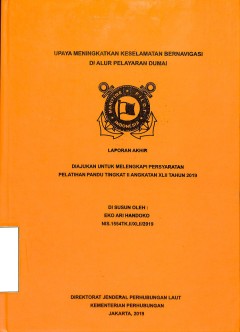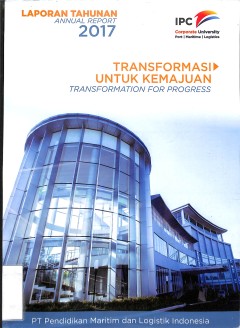Ditapis dengan

Guidelines for Maritime Legislation
- Edisi
- 3
- ISBN/ISSN
- -
- Deskripsi Fisik
- -
- Judul Seri
- -
- No. Panggil
- SC TXT GUI u
- Edisi
- 3
- ISBN/ISSN
- -
- Deskripsi Fisik
- -
- Judul Seri
- -
- No. Panggil
- SC TXT GUI u

Buoy Engineering
- Edisi
- -
- ISBN/ISSN
- 0-471-07156-0
- Deskripsi Fisik
- 314 p
- Judul Seri
- -
- No. Panggil
- TXT SC BER b
- Edisi
- -
- ISBN/ISSN
- 0-471-07156-0
- Deskripsi Fisik
- 314 p
- Judul Seri
- -
- No. Panggil
- TXT SC BER b

European Offshore Maritime
- Edisi
- -
- ISBN/ISSN
- -
- Deskripsi Fisik
- 141 p
- Judul Seri
- -
- No. Panggil
- PO TXT EUR h
- Edisi
- -
- ISBN/ISSN
- -
- Deskripsi Fisik
- 141 p
- Judul Seri
- -
- No. Panggil
- PO TXT EUR h

Modern Marine Terminal Operations and Management
- Edisi
- -
- ISBN/ISSN
- -
- Deskripsi Fisik
- 293 p
- Judul Seri
- -
- No. Panggil
- SC TXT MOD w
- Edisi
- -
- ISBN/ISSN
- -
- Deskripsi Fisik
- 293 p
- Judul Seri
- -
- No. Panggil
- SC TXT MOD w

Analisa Ekonomi Proyek-Proyek Pembangunan
- Edisi
- -
- ISBN/ISSN
- 0-8018-1817-6
- Deskripsi Fisik
- 203p
- Judul Seri
- -
- No. Panggil
- SC TXT ANA l
- Edisi
- -
- ISBN/ISSN
- 0-8018-1817-6
- Deskripsi Fisik
- 203p
- Judul Seri
- -
- No. Panggil
- SC TXT ANA l

Course Outline & Presentation : Maritime Finance & Controlling Management
- Edisi
- Maritime Finance & Controlling Management
- ISBN/ISSN
- -
- Deskripsi Fisik
- illus,; 30 cm
- Judul Seri
- Maritime Finance & Controlling Management
- No. Panggil
- CC STC COU m C1
- Edisi
- Maritime Finance & Controlling Management
- ISBN/ISSN
- -
- Deskripsi Fisik
- illus,; 30 cm
- Judul Seri
- Maritime Finance & Controlling Management
- No. Panggil
- CC STC COU m C1

Reader : Maritime Policies & Governmental Politics
- Edisi
- Maritime Policies & Governmental Politics
- ISBN/ISSN
- -
- Deskripsi Fisik
- illus,; 30 cm
- Judul Seri
- Maritime Policies & Governmental Politics
- No. Panggil
- CC STC REA m C1
- Edisi
- Maritime Policies & Governmental Politics
- ISBN/ISSN
- -
- Deskripsi Fisik
- illus,; 30 cm
- Judul Seri
- Maritime Policies & Governmental Politics
- No. Panggil
- CC STC REA m C1

Syllabus : Maritime Policies & Governmental Politics Part II
- Edisi
- Maritime Policies & Governmental Politics
- ISBN/ISSN
- -
- Deskripsi Fisik
- illus,; 30 cm
- Judul Seri
- Maritime Policies & Governmental Politics
- No. Panggil
- CC STC SYL m C1
- Edisi
- Maritime Policies & Governmental Politics
- ISBN/ISSN
- -
- Deskripsi Fisik
- illus,; 30 cm
- Judul Seri
- Maritime Policies & Governmental Politics
- No. Panggil
- CC STC SYL m C1

Syllabus : introduction Cargo Operation Management Break Bulk Trade
- Edisi
- Cargo Operation Management
- ISBN/ISSN
- -
- Deskripsi Fisik
- 84 page
- Judul Seri
- -
- No. Panggil
- CC STC SYL i C1
- Edisi
- Cargo Operation Management
- ISBN/ISSN
- -
- Deskripsi Fisik
- 84 page
- Judul Seri
- -
- No. Panggil
- CC STC SYL i C1

Course Outline & Study Guide : Maritime Finance & Controlling Management
- Edisi
- Maritime Finance & Controlling Management
- ISBN/ISSN
- -
- Deskripsi Fisik
- illus,; 30 cm
- Judul Seri
- Maritime Finance & Controlling Management
- No. Panggil
- CC STC COU m C1
- Edisi
- Maritime Finance & Controlling Management
- ISBN/ISSN
- -
- Deskripsi Fisik
- illus,; 30 cm
- Judul Seri
- Maritime Finance & Controlling Management
- No. Panggil
- CC STC COU m C1

Reader : Maritime Finance & Controlling Management
- Edisi
- Maritime Finance & Controlling Management
- ISBN/ISSN
- -
- Deskripsi Fisik
- illus,; 30 cm
- Judul Seri
- Maritime Finance & Controlling Management
- No. Panggil
- CC STC REA m C1
- Edisi
- Maritime Finance & Controlling Management
- ISBN/ISSN
- -
- Deskripsi Fisik
- illus,; 30 cm
- Judul Seri
- Maritime Finance & Controlling Management
- No. Panggil
- CC STC REA m C1

Presentations : Maritime Policies & Governmental Politics
- Edisi
- Maritime Policies & Governmental Politics
- ISBN/ISSN
- -
- Deskripsi Fisik
- illus,; 30 cm
- Judul Seri
- Maritime Policies & Governmental Politics
- No. Panggil
- CC STC PRE s P1
- Edisi
- Maritime Policies & Governmental Politics
- ISBN/ISSN
- -
- Deskripsi Fisik
- illus,; 30 cm
- Judul Seri
- Maritime Policies & Governmental Politics
- No. Panggil
- CC STC PRE s P1

Course Outline : Shipping & Port Economics
- Edisi
- Shipping & Port Economics
- ISBN/ISSN
- -
- Deskripsi Fisik
- illus,; 30 cm
- Judul Seri
- Shipping & Port Economics
- No. Panggil
- CC STC COU s C1
- Edisi
- Shipping & Port Economics
- ISBN/ISSN
- -
- Deskripsi Fisik
- illus,; 30 cm
- Judul Seri
- Shipping & Port Economics
- No. Panggil
- CC STC COU s C1

Presentation Materials : Maritime Surveying & Safety Management
- Edisi
- Maritime Surveying & Safety Management
- ISBN/ISSN
- -
- Deskripsi Fisik
- illus,; 30 cm
- Judul Seri
- Maritime Surveying & Safety Management
- No. Panggil
- CC STC PRE m C1
- Edisi
- Maritime Surveying & Safety Management
- ISBN/ISSN
- -
- Deskripsi Fisik
- illus,; 30 cm
- Judul Seri
- Maritime Surveying & Safety Management
- No. Panggil
- CC STC PRE m C1

Reader : Corporate Maritime Management and Strategies
- Edisi
- Corporate Maritime Management and Strategies
- ISBN/ISSN
- -
- Deskripsi Fisik
- illus,; 30 cm
- Judul Seri
- Corporate Maritime Management and Strategies
- No. Panggil
- CC STC REA c C1
- Edisi
- Corporate Maritime Management and Strategies
- ISBN/ISSN
- -
- Deskripsi Fisik
- illus,; 30 cm
- Judul Seri
- Corporate Maritime Management and Strategies
- No. Panggil
- CC STC REA c C1

Course Outline and Study Guide : Maritime Finance & Controlling Management
- Edisi
- Maritime Finance & Controlling Management
- ISBN/ISSN
- -
- Deskripsi Fisik
- illus,; 30 cm
- Judul Seri
- -
- No. Panggil
- CC STC COS m C1
- Edisi
- Maritime Finance & Controlling Management
- ISBN/ISSN
- -
- Deskripsi Fisik
- illus,; 30 cm
- Judul Seri
- -
- No. Panggil
- CC STC COS m C1

Presentation Materials : Maritime Finance & Controlling Management
- Edisi
- Maritime Finance & Controlling Management
- ISBN/ISSN
- -
- Deskripsi Fisik
- illus,; 30 cm
- Judul Seri
- Maritime Finance & Controlling Management
- No. Panggil
- CC STC PRE m C1
- Edisi
- Maritime Finance & Controlling Management
- ISBN/ISSN
- -
- Deskripsi Fisik
- illus,; 30 cm
- Judul Seri
- Maritime Finance & Controlling Management
- No. Panggil
- CC STC PRE m C1

Syllabus : Trasnportation Law
- Edisi
- Trasnportation Law
- ISBN/ISSN
- -
- Deskripsi Fisik
- illus,; 30 cm
- Judul Seri
- Trasnportation Law
- No. Panggil
- CC STC SYL t C1
- Edisi
- Trasnportation Law
- ISBN/ISSN
- -
- Deskripsi Fisik
- illus,; 30 cm
- Judul Seri
- Trasnportation Law
- No. Panggil
- CC STC SYL t C1

Presentations : Trasnportation Law
- Edisi
- Trasnportation Law
- ISBN/ISSN
- -
- Deskripsi Fisik
- 37 page
- Judul Seri
- Trasnportation Law
- No. Panggil
- CC STC PRE TRA C1
- Edisi
- Trasnportation Law
- ISBN/ISSN
- -
- Deskripsi Fisik
- 37 page
- Judul Seri
- Trasnportation Law
- No. Panggil
- CC STC PRE TRA C1

Syllabus : Shipping, Trade & Trasnportation Law
- Edisi
- Shipping, Trade & Trasnportation Law
- ISBN/ISSN
- -
- Deskripsi Fisik
- 44 page
- Judul Seri
- Shipping, Trade & Trasnportation Law
- No. Panggil
- CC STC SYL s C1
- Edisi
- Shipping, Trade & Trasnportation Law
- ISBN/ISSN
- -
- Deskripsi Fisik
- 44 page
- Judul Seri
- Shipping, Trade & Trasnportation Law
- No. Panggil
- CC STC SYL s C1

Course Outline & Study Guide : Shipping, Trade & Trasnportation Law
- Edisi
- Shipping, Trade & Trasnportation Law
- ISBN/ISSN
- -
- Deskripsi Fisik
- 11 page
- Judul Seri
- Shipping, Trade & Trasnportation Law
- No. Panggil
- CC STC COS s C1
- Edisi
- Shipping, Trade & Trasnportation Law
- ISBN/ISSN
- -
- Deskripsi Fisik
- 11 page
- Judul Seri
- Shipping, Trade & Trasnportation Law
- No. Panggil
- CC STC COS s C1

Reader : Shipping, Trade & Trasnportation Law
- Edisi
- Shipping, Trade & Trasnportation Law
- ISBN/ISSN
- -
- Deskripsi Fisik
- illus,; 30 cm
- Judul Seri
- Shipping, Trade & Trasnportation Law
- No. Panggil
- CC STC REA sh C1
- Edisi
- Shipping, Trade & Trasnportation Law
- ISBN/ISSN
- -
- Deskripsi Fisik
- illus,; 30 cm
- Judul Seri
- Shipping, Trade & Trasnportation Law
- No. Panggil
- CC STC REA sh C1

Presentations : Shipping, Trade & Trasnportation Law
- Edisi
- Shipping, Trade & Trasnportation Law
- ISBN/ISSN
- -
- Deskripsi Fisik
- 119 page
- Judul Seri
- Shipping, Trade & Trasnportation Law
- No. Panggil
- CC STC PRE s C1
- Edisi
- Shipping, Trade & Trasnportation Law
- ISBN/ISSN
- -
- Deskripsi Fisik
- 119 page
- Judul Seri
- Shipping, Trade & Trasnportation Law
- No. Panggil
- CC STC PRE s C1

Reader Maritime Conversations : Shipping, Trade & Trasnportation Law
- Edisi
- Shipping, Trade & Trasnportation Law
- ISBN/ISSN
- -
- Deskripsi Fisik
- illus,; 30 cm
- Judul Seri
- Shipping, Trade & Trasnportation Law
- No. Panggil
- CC STC REA s C1
- Edisi
- Shipping, Trade & Trasnportation Law
- ISBN/ISSN
- -
- Deskripsi Fisik
- illus,; 30 cm
- Judul Seri
- Shipping, Trade & Trasnportation Law
- No. Panggil
- CC STC REA s C1

Upaya Meningkatkan Keselamatan Bernavigasi Di Alur Pelayaran Dumai
- Edisi
- Laporan Akhir Pelatihan Pandu tingkat II Angkatan
- ISBN/ISSN
- -
- Deskripsi Fisik
- 36 p
- Judul Seri
- Laporan Akhir Pelatihan Pandu tingkat II Angkatan XLII Tahun 2019
- No. Panggil
- IPC REP 2019 UPA e
- Edisi
- Laporan Akhir Pelatihan Pandu tingkat II Angkatan
- ISBN/ISSN
- -
- Deskripsi Fisik
- 36 p
- Judul Seri
- Laporan Akhir Pelatihan Pandu tingkat II Angkatan XLII Tahun 2019
- No. Panggil
- IPC REP 2019 UPA e

The woman of power
- Edisi
- -
- ISBN/ISSN
- -
- Deskripsi Fisik
- 181 p.
- Judul Seri
- -
- No. Panggil
- TXT LE JAM t C.1
- Edisi
- -
- ISBN/ISSN
- -
- Deskripsi Fisik
- 181 p.
- Judul Seri
- -
- No. Panggil
- TXT LE JAM t C.1

Workshop methode investigasi bagi tim insdispliner
- Edisi
- -
- ISBN/ISSN
- -
- Deskripsi Fisik
- 35 p.
- Judul Seri
- -
- No. Panggil
- IPC GUI WOR p C.1
- Edisi
- -
- ISBN/ISSN
- -
- Deskripsi Fisik
- 35 p.
- Judul Seri
- -
- No. Panggil
- IPC GUI WOR p C.1

Laporan pelaksanaan workshop pembekalan peraturan maritim dan navigasi vts op…
- Edisi
- 2016
- ISBN/ISSN
- -
- Deskripsi Fisik
- 1 halaman buku p.
- Judul Seri
- -
- No. Panggil
- IPC REP 2016 WOR p C.1
- Edisi
- 2016
- ISBN/ISSN
- -
- Deskripsi Fisik
- 1 halaman buku p.
- Judul Seri
- -
- No. Panggil
- IPC REP 2016 WOR p C.1

Laporan Tahunan 2017 : Transformasi Untuk Kemajuan
- Edisi
- Laporan Tahunan 2017
- ISBN/ISSN
- -
- Deskripsi Fisik
- 214p
- Judul Seri
- -
- No. Panggil
- IPC REP 2017 LAP l C.1
- Edisi
- Laporan Tahunan 2017
- ISBN/ISSN
- -
- Deskripsi Fisik
- 214p
- Judul Seri
- -
- No. Panggil
- IPC REP 2017 LAP l C.1

A non-structural test for competition in the container liner shipping industry
The liner shipping industry has experienced fundamental changes in recent years due to globalization, deregulation, horizontal/vertical integration, (increased) cooperation, rationalization, developments in information technology, consolidation and increased concentration. These developments may affect competition. As in other industries, competition in the (containerized) liner shipping indust…
- Edisi
- Maritime Logistics
- ISBN/ISSN
- -
- Deskripsi Fisik
- 17 halaman
- Judul Seri
- A non-structural test for competition in the container liner shipping industry
- No. Panggil
- ATC PO CHR a

An Evaluation of Container Development Strategies in the Port of Taichung
Abstract The objective of this study is to examine the container development strategies in the port of Taichung from the viewpoints of carriers, port authorities and shipping academics. The six most important strategic attributes from the all respondents perceptions are Enhancing the services of direct shipping with Mainland China, simplified customs procedures, simplified administrative proce…
- Edisi
- The Asian Journal of Shipping and Logistics
- ISBN/ISSN
- -
- Deskripsi Fisik
- 26 halaman
- Judul Seri
- An Evaluation of Container Development Strategies in the Port of Taichung
- No. Panggil
- ATC PO CHI a

Understanding organizational change for alliancing
Abstract Purpose – The purpose of this paper is to examine an organization’s operational alignment in the process of alliance formation. Design/methodology/approach – A literature study was conducted on the strategic importance of assessing and aligning organizations’ operations for alliancing. Furthermore, an instrumental case study was conducted to provide insight in the degree of op…
- Edisi
- Journal of Organizational Change Management
- ISBN/ISSN
- -
- Deskripsi Fisik
- 18 halaman
- Judul Seri
- Understanding organizational change for alliancing
- No. Panggil
- ATC PO BIA a

Towards a Better Understanding of Experience during Trips: Impact on Satisfac…
AbstractPurpose – The purpose of this paper is to reinforce the experiential paradigm from which academics and practitioners currently explain consumer decision making in touristic activities. More specifically, this research brings new insights for understanding consumption experience. The aim is to establish relationships between Experience, Satisfaction, Destination Attachment, as well as …
- Edisi
- International Journal of Tourism Cities
- ISBN/ISSN
- -
- Deskripsi Fisik
- 40 halaman
- Judul Seri
- Towards a Better Understanding of Experience during Trips: Impact on Satisfaction, Destination Attachment and Word-of-Mouth
- No. Panggil
- ATC PO HAG a

Time to rethink Norwegian maritime collaboration exercises
Purpose This case study maps the perceived collaboration between public, private, and volunteer organizations during maritime crisis work, with a substantive focus on communication, information flow, and distribution of activities. The exercise studied was held in the far north in Norway. It was estimated to be Europe’s most extensive exercise in 2016. Design The data were collected through …
- Edisi
- International Journal of Emergency Services
- ISBN/ISSN
- -
- Deskripsi Fisik
- 30 halaman
- Judul Seri
- Time to rethink Norwegian maritime collaboration exercises
- No. Panggil
- ATC PO ELS a

Service quality in maritime transport: conceptual model and empirical evidence
Abstract Purpose – The purpose of this paper is to extend knowledge on service quality and how it is defined and thus, managed, in the context of maritime transport by proposing and testing a new conceptual model of service quality. Design/methodology/approach – The study used a sample of 197 shipping companies, port operators and freight forwarders/logistics service providers, employing t…
- Edisi
- Service quality in maritime transport
- ISBN/ISSN
- -
- Deskripsi Fisik
- 26 halaman
- Judul Seri
- Service quality in maritime transport: conceptual model and empirical evidence
- No. Panggil
- ATC PO VIN a

Senses of “shipscapes”: an artful navigation of ship architecture and aes…
Abstract Purpose – In the context of organizational aesthetics, “built environments” remain under-explored. The purpose of this paper is to enter the maritime world of ship architectures to navigate sensory-aesthetic knowledge of a sailor’s place-based memories. Design/methodology/approach – Challenges have been issued to explore the potential for artistic-sensual methodologies to b…
- Edisi
- Journal of Organizational Change Management
- ISBN/ISSN
- -
- Deskripsi Fisik
- 19 halaman
- Judul Seri
- Senses of “shipscapes”: an artful navigation of ship architecture and aesthetics
- No. Panggil
- ATC PO JOH a

Revisiting the resource-based view on logistics performance in the shipping i…
Abstract Purpose –The purpose of this study is to evaluate empirically the impact of intrafirm resources, interfirm relationships, and logistics service capabilities on logistics performance in the container logistics context. Design/methodology/approach –Factor analysis was employed to identify the key intrafirm resources (i.e. tangible assets and intangible assets), interfirm relation…
- Edisi
- International Journal of Physical Distribution & L
- ISBN/ISSN
- -
- Deskripsi Fisik
- 29 halaman
- Judul Seri
- Revisiting the resource-based view on logistics performance in the shipping industry
- No. Panggil
- ATC PO CHU a

Modeling the Increased Complexity of New York City's Refuse Marine Transport…
The New York City Department of Sanitation operates the world's largest refuse marine transport system. Waste trucks unload their cargo at land-based transfer stations where refuse is placed in barges and then towed by tugboats to the Fresh Kills Landfill in Staten Island. In the early 1980s, the city commissioned the development of a computer-based model for use in fleet sizing and opera…
- Edisi
- J STOR
- ISBN/ISSN
- -
- Deskripsi Fisik
- 23 halaman
- Judul Seri
- Modeling the Increased Complexity of New York City's Refuse Marine Transport System
- No. Panggil
- ATC PO OCT a

Mechanical integrity of gas turbine enclosure doors under fire test condition…
Abstract Purpose – As fire doors are passive fire protection parts, the doors have to be certified through standard fire tests. It is usual practice to perform the standard fire testing on the components which require the fire certification. However, some gas turbine enclosure doors are too large to test at the test facility and hence the fire resistance test is practically not possible. The…
- Edisi
- Journal of Structural Fire Engineering
- ISBN/ISSN
- -
- Deskripsi Fisik
- 15 halaman
- Judul Seri
- Mechanical integrity of gas turbine enclosure doors under fire test conditions for A0 fire rating
- No. Panggil
- ATC PO PRA a

Maritime Safety Culture in Europe
Therefore, it was time for the European Union to act and to develop a new concept of safety culture. A parallel can be drawn between the attitude of the International Maritime Organisation (IMO) and the attitude of the European Union. The IMO is well known for promoting and improving safety and also in being reactive to maritime disasters. Now we discover a new philosophy of “anticipating a…
- Edisi
- Managerial Law
- ISBN/ISSN
- -
- Deskripsi Fisik
- 61 halaman
- Judul Seri
- Maritime Safety Culture in Europe
- No. Panggil
- ATC PO LUC a

Maritime piracy and the cost of world trade*
Abstract Purpose – The aim of this study is to determine the nature and extent of the threat of global maritime piracy. The cost of global piracy has been estimated at USD15-25 billion, reaching an all-time high in 2011, remaining an ongoing threat to world trade and contributing to high commodity costs.
- Edisi
- Maritime piracy
- ISBN/ISSN
- -
- Deskripsi Fisik
- 14 Halaman
- Judul Seri
- Maritime piracy and the cost of world trade*
- No. Panggil
- ATC PO STE a

Long-term container throughput forecast and equipment planning: the case of B…
Abstract Purpose – This paper aims to forecast inbound and outbound container throughput for Bangkok Port to 2041 and uses the results to inform the future planning and management of the port’s container terminal. Design/methodology/approach – The data used cover a period of 16 years (192 months of observations). Data sources include the Bank of Thailand and the Energy Policy and Plannin…
- Edisi
- Maritime Business Review
- ISBN/ISSN
- -
- Deskripsi Fisik
- 18 halaman
- Judul Seri
- Long-term container throughput forecast and equipment planning: the case of Bangkok Port
- No. Panggil
- ATC PO VEE a

Knowledge management capability and supply chain management practices in the …
Abstract Purpose – The main goal of this research is to examine the effect of knowledge management capabilities on supply chain management practices and organizational performance in firms, in addition to examining the effect of supply chain management on organizational performance. Design/methodology/approach – To demonstrate the effect of knowledge management capabilities on supply chain…
- Edisi
- Business Process Management Journal
- ISBN/ISSN
- -
- Deskripsi Fisik
- 24 halaman
- Judul Seri
- Knowledge management capability and supply chain management practices in the Saudi food industry
- No. Panggil
- ATC PO AHM a

Knowledge capture to inform sustainable maritime operations
Purpose - The purpose of this paper is to report an explicit taxonomy of maritime operations (MO) to guide Harbour Masters (HM)s of smaller ports in planning more sustainable operations. Design/methodology/approach – This research presents strategies for building theory to promote more sustainable port management in a two-stage research design. Starting from a base taxonomy in research stag…
- Edisi
- International Journal of Operations & Production M
- ISBN/ISSN
- -
- Deskripsi Fisik
- 25 halaman
- Judul Seri
- Knowledge capture to inform sustainable maritime operations
- No. Panggil
- ATC PO AND a

Integration, supply chain resilience, and service performance in third-party …
Abstract Purpose – Supply chain resilience (SCR) is essential to the success of firms. However, very few studies have focused on the relationships between different types of integration, SCR and service performance from the perspective of third-party logistics providers (3PLs). The purpose of this paper is to develop and assesses a conceptual model for these relationships. Design/methodolog…
- Edisi
- The International Journal of Logistics Management
- ISBN/ISSN
- -
- Deskripsi Fisik
- 19 halamn
- Judul Seri
- Integration, supply chain resilience, and service performance in third-party logistics providers
- No. Panggil
- ATC PO CHI a

Impact of Maritime Labour Convention on design of new ships
Abstract Purpose – The Maritime Labour Convention (MLC) embodies standards of existing international maritime labour conventions and recommendations, as well as the fundamental principles to be found in other international labour conventions. The aim of the convention is to address the employment standards of seafarers in the areas of fair wages, contractual terms, working and living condit…
- Edisi
- Maritime Business Review
- ISBN/ISSN
- -
- Deskripsi Fisik
- 14 halaman
- Judul Seri
- Impact of Maritime Labour Convention on design of new ships
- No. Panggil
- ATC PO HWA a

Hong Kong maritime arbitration under the Arbitration Ordinance 2011
Abstract Purpose – In 2011, the new Arbitration Ordinance took effect in Hong Kong. This paper aims to discuss the new features on maritime arbitration. Design/methodology/approach – The relevant provisions of the Arbitration Ordinance 2011 and the legal cases are examined. Findings – Hong Kong is a first class maritime arbitration centre in the Asia Pacific Region. Originality/value –…
- Edisi
- Maritime Business Review
- ISBN/ISSN
- -
- Deskripsi Fisik
- 10 halaman
- Judul Seri
- Hong Kong maritime arbitration under the Arbitration Ordinance 2011
- No. Panggil
- ATC PO SIK a

Green Maritime Logistics and Sustainability
Abstract The environmental consequences of international trade and transport have gained importance as a result of the current climate debate. Products are increasingly being produced in one part of the world, transported to another country and then redistributed to their final country of consumption. Since more than 80% of world trade tonnage measured in metric tons is carried by seagoing ve…
- Edisi
- Maritime Logistics
- ISBN/ISSN
- -
- Deskripsi Fisik
- 20 halaman
- Judul Seri
- Green Maritime Logistics and Sustainability
- No. Panggil
- ATC PO HAA a

Evaluating the use of alternative maritime power in Taiwan
Abstract Purpose – The purpose of this study is to empirically evaluate the impacts of institutional pressures on the use of alternative maritime power (AMP) and which in turn enhance environmental performance in the maritime shipping context. Design/methodology/approach – Factor analysis was used to identify the key coercive pressure, normative pressure, mimetic pressure, AMP practice and…
- Edisi
- Maritime Business Review
- ISBN/ISSN
- -
- Deskripsi Fisik
- 18 Halaman
- Judul Seri
- Evaluating the use of alternative maritime power in Taiwan
- No. Panggil
- ATC PO CHU a

Evaluating the supply chain information flow in Egyptian SMEs using six sigma…
Abstract Purpose – There is a great deal of concern among the Egyptian economy that small- and medium-sized enterprises’ (SMEs’) potentials are not fully used although they dominate it and contribute to its success. The question is what challenges are preventing those SMEs from performing efficiently. This research aims to focus on examining the issues regarding the supply chain of Egypt…
- Edisi
- International Journal of Lean Six Sigma
- ISBN/ISSN
- -
- Deskripsi Fisik
- 30 halaman
- Judul Seri
- International Journal of Lean Six Sigma
- No. Panggil
- ATC PO OMN a
 Karya Umum
Karya Umum  Filsafat
Filsafat  Agama
Agama  Ilmu-ilmu Sosial
Ilmu-ilmu Sosial  Bahasa
Bahasa  Ilmu-ilmu Murni
Ilmu-ilmu Murni  Ilmu-ilmu Terapan
Ilmu-ilmu Terapan  Kesenian, Hiburan, dan Olahraga
Kesenian, Hiburan, dan Olahraga  Kesusastraan
Kesusastraan  Geografi dan Sejarah
Geografi dan Sejarah